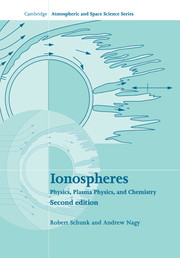Book contents
- Frontmatter
- Contents
- Chapter 1 Introduction
- Chapter 2 Space environment
- Chapter 3 Transport equations
- Chapter 4 Collisions
- Chapter 5 Simplified transport equations
- Chapter 6 Wave phenomena
- Chapter 7 Magnetohydrodynamic formulation
- Chapter 8 Chemical processes
- Chapter 9 Ionization and energy exchange processes
- Chapter 10 Neutral atmospheres
- Chapter 11 The terrestrial ionosphere at middle and low latitudes
- Chapter 12 The terrestrial ionosphere at high latitudes
- Chapter 13 Planetary ionospheres
- Chapter 14 Ionospheric measurement techniques
- Appendix A Physical constants and conversions
- Appendix B Vector relations and operators
- Appendix C Integrals and transformations
- Appendix D Functions and series expansions
- Appendix E Systems of units
- Appendix F Maxwell transfer equations
- Appendix G Collision models
- Appendix H Maxwell velocity distribution
- Appendix I Semilinear expressions for transport coefficients
- Appendix J Solar fluxes and relevant cross sections
- Appendix K Atmospheric models
- Appendix L Scalars, vectors, dyadics, and tensors
- Appendix M Radio wave spectrum
- Appendix N Simple derivation of continuity equation
- Appendix O Numerical solution for F region ionization
- Appendix P Monte Carlo methods
- Index
Chapter 4 - Collisions
Published online by Cambridge University Press: 22 January 2010
- Frontmatter
- Contents
- Chapter 1 Introduction
- Chapter 2 Space environment
- Chapter 3 Transport equations
- Chapter 4 Collisions
- Chapter 5 Simplified transport equations
- Chapter 6 Wave phenomena
- Chapter 7 Magnetohydrodynamic formulation
- Chapter 8 Chemical processes
- Chapter 9 Ionization and energy exchange processes
- Chapter 10 Neutral atmospheres
- Chapter 11 The terrestrial ionosphere at middle and low latitudes
- Chapter 12 The terrestrial ionosphere at high latitudes
- Chapter 13 Planetary ionospheres
- Chapter 14 Ionospheric measurement techniques
- Appendix A Physical constants and conversions
- Appendix B Vector relations and operators
- Appendix C Integrals and transformations
- Appendix D Functions and series expansions
- Appendix E Systems of units
- Appendix F Maxwell transfer equations
- Appendix G Collision models
- Appendix H Maxwell velocity distribution
- Appendix I Semilinear expressions for transport coefficients
- Appendix J Solar fluxes and relevant cross sections
- Appendix K Atmospheric models
- Appendix L Scalars, vectors, dyadics, and tensors
- Appendix M Radio wave spectrum
- Appendix N Simple derivation of continuity equation
- Appendix O Numerical solution for F region ionization
- Appendix P Monte Carlo methods
- Index
Summary
Collisions play a fundamental role in the dynamics and energetics of ionospheres. They are responsible for the production of ionization, the diffusion of plasma from high to low density regions, the conduction of heat from hot to cold regions, the exchange of energy between different species, and other processes. The collisional processes can be either elastic or inelastic. The interactions leading to chemical reactions are discussed in Chapter 8. In an elastic collision, the momentum and kinetic energy of the colliding particles are conserved, while this is not the case in an inelastic collision. The exact nature of the collision process depends both on the relative kinetic energy of the colliding particles and on the type of particles. In general, for low energies, elastic collisions dominate, but as the relative kinetic energy increases, inelastic collisions become progressively more important. The order of importance is from elastic to rotational, vibrational, and electronic excitation, and then to ionization as the relative kinetic energy increases. However, the different collision processes may affect the continuity, momentum, and energy equations in different ways. For example, ionization of neutral gases by solar radiation and particle impact are the main sources of plasma in the ionospheres and these processes must be included in the continuity equation. On the other hand, ionization collisions are very infrequent compared with binary elastic collisions under most circumstances, and therefore, the momentum perturbation associated with the ionization process is generally not important and can be neglected in the momentum equation.
- Type
- Chapter
- Information
- IonospheresPhysics, Plasma Physics, and Chemistry, pp. 72 - 112Publisher: Cambridge University PressPrint publication year: 2009
- 1
- Cited by

